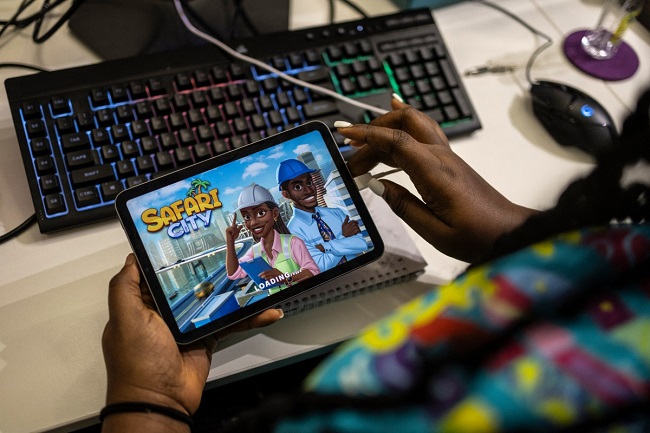In a dream, a mysterious voice calls out in the night to King Alantako, warning of “chaos” ahead for the young Nigerian sovereign.
He awakens with a start and embarks on an adventure that will save Ile Kaaro Oojiire and fulfill his destiny.
So begins The Wild Kingdoms — a Nigerian-made video game for mobile phones, published in 2022 by the Nigerian studio Kucheza.
In a gaming world dominated by US and Asian giants, it is distinguished by its setting: west Africa’s Yoruba ethnic culture.
To develop their nascent industry, Nigerian studios are drawing on their native traditions and “natural creativity”, said Hugo Obi, the Lagos-based founder of another maker, Maliyo Games.
Nigeria has done very well to develop the ability to tell stories, tell unique stories, create characters, and create worlds.
Although the sector is still in its early stages, they see enormous potential in a nation with one of the world’s fastest-growing populations and 70% of its citizens under the age of 30.
“If you look at the diversity of food as an example, the diversity of languages”, Obi said, “once you then start to blend those together, you start to create new forms and new styles”.


Growing Nigerian game studios
In five years, Maliyo has grown from three to 36 employees, starting with a three-year-old online training program to form a team of developers and designers in five African nations.
Iwaju Rising Chef, an animated series that was adapted from an animated series that was broadcast on Disney last year, was produced by a team of 14 people spread across Africa for 14 months.
The player prepares Nigerian specialties like puff puffs and jollof rice in it.
Out of the five leading African nations in the video game industry, Nigeria, according to a survey by Maliyo, is the one with the fastest-growing growth, with Algeria, Egypt, South Africa, and Tunisia the others.
Nigerian gaming revenues were “surging”, the report said, from $11 million in 2019 to over $60 million in 2024.
Nearly a quarter of all studios on the continent were located in Nigeria, according to the report.



Creative economy: what is it?
Besides the challenge of finding trained developers, Nigerian studios also struggle to secure funding, studios complain.
“Nigerians invest in real estate, Nigerians invest in oil and gas, Nigerians invest in anything tangible”, said Obi of Maliyo Games.
“It is still very new and seen as high-risk,” said one author.
As well as the funding battle, developers also face patchy power and internet networks, said Ewere Ekpenisi-Igumbor, co-founder of the studio Dimension 11.
Another Yoruba legends-themed title, Legends of Orisha, is being developed by his studio in association with Microsoft for its Xbox console.
He thinks that the nation is beginning to notice and applauds the establishment of a new “creative economy” and cultural ministry in 2023.
“Historically, the government wasn’t as involved or even aware of the industry”, he said. However, things are changing right now.

Low domestic game demand
“Nigeria is arguably the second or third largest country for game development” on the continent, said Vic Bassey, founder of the specialist website Games Industry Africa.
Although it produces a lot of games, he continued, mentioning that its share of global production is “less than 0.5 percent,” and that comparatively few people in the nation can afford to buy them.
The Wild Kingdoms has seen its biggest share of downloads in Brazil, said Bukola Akingbade, founder of Kucheza, the studio that developed it.
A Yoruba spiritual tradition dates back to the time of the slave trade and is present in the Latin American country.
David Tomide, a 29-year-old who calls himself “the first gamer influencer in Nigeria”, looks to youngsters as a source of hope for the sector, with “Generation Alpha” teenagers “always wanting to be on their phone”.
“Most of the games that we play here in Nigeria are not Nigerian-made”, he said.
Source: Channels TV
Leave a Reply